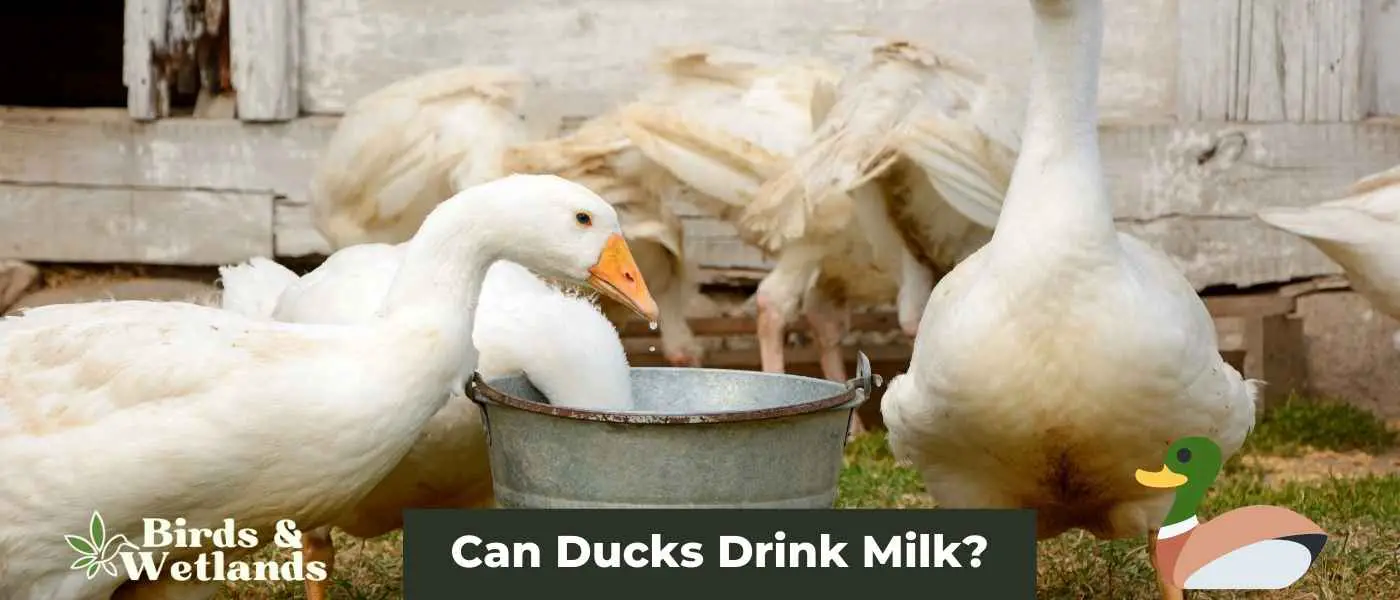If you’re a duck owner, you may be wondering whether your feathered friends can enjoy a little milk as a treat. The answer is a bit complicated, so let’s dive into it.
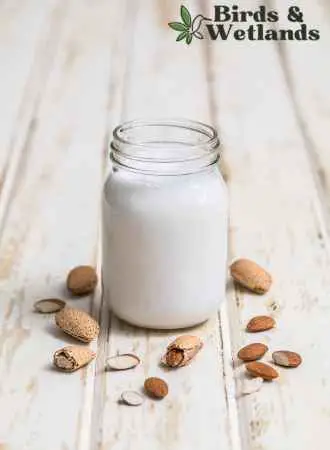
No, ducks should not be given milk to drink. Ducks are primarily lactose intolerant, which means they cannot digest lactose, a sugar found in milk and dairy products. Consuming milk can lead to digestive issues and discomfort for ducks. Instead, provide them with clean, fresh water to ensure proper hydration.
The Digestive System of Ducks
To understand whether ducks can drink milk, it’s helpful to know a bit about their digestive system. Ducks are waterfowl, which means they are designed to drink water. They have a gizzard, a muscular organ that helps them grind up food, and they produce an enzyme called amylase that helps them digest carbohydrates.
However, ducks are not capable of digesting lactose, the sugar found in milk. Like many mammals, ducks lose the ability to digest lactose as they grow older. This means that giving adult ducks milk can lead to digestive problems like diarrhea and upset stomach. Never feed wild ducks milk or milk based products.
Milk and Ducklings
While adult ducks should avoid milk, younger ducklings may be able to tolerate small amounts. Ducklings have a higher tolerance for lactose than adult ducks, but they still shouldn’t be given large quantities of milk. Milk should never be the primary source of nutrition for ducklings.
If you do decide to give your ducklings a bit of milk, it’s important to be cautious. Too much milk can cause digestive problems, and it’s important to make sure your ducklings are getting a balanced diet with enough protein, fat, and calcium.
Feeding Ducklings
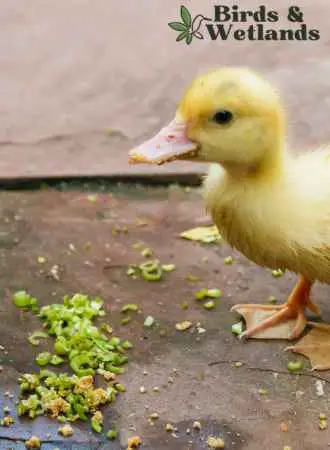
If you’re raising ducklings, it’s important to provide them with a diet that meets their nutritional needs. Younger ducklings need a diet with a higher protein content, while older ducklings can tolerate more carbohydrates and fat.
Some good options for feeding wild ducklings include:
- Commercial duck feed: This is a balanced feed that is formulated specifically for ducks. Look for a feed that is appropriate for your ducklings’ age.
- Eggshells: Crushed eggshells are a good source of calcium for ducklings. Make sure to clean and sterilize the eggshells before feeding them to your ducklings.
- Vegetables: Ducklings can enjoy a variety of vegetables, including lettuce, spinach, and peas. Make sure to chop the vegetables into small pieces.
- Additives: Some duck owners add supplements like brewer’s yeast or poultry grit to their ducklings’ feed. These can help improve digestion and provide additional nutrients.
Nutritional Benefits of Milk for Ducks
Milk is a nutritious beverage that provides several essential nutrients to humans. However, the question remains: can ducks drink milk, and if so, what are the nutritional benefits?
Ducks are omnivores and require a balanced diet that includes protein, carbohydrates, fats, vitamins, and minerals. Although milk is not a natural part of their diet, it can be beneficial in some ways. Here are some of the nutritional benefits of milk for ducks:
Calcium
Calcium is a vital mineral for ducks as it helps in the development and maintenance of strong bones and eggshells. Milk is an excellent source of calcium, and feeding it to ducks can supplement their calcium requirements.
Protein
Protein is an essential nutrient that helps in the growth and repair of muscles, feathers, and other tissues. Milk contains high-quality protein that can provide the necessary amino acids to ducks.
Vitamins
Milk is a rich source of several vitamins, including vitamin D, vitamin B12, and riboflavin. These vitamins are essential for maintaining healthy skin, feathers, and eyesight in ducks.
Hydration
Milk contains a high percentage of water, which can help in keeping ducks hydrated. However, it is important to note that milk should not replace water as the primary source of hydration for ducks.
While milk can provide some nutritional benefits to ducks, it should not be a significant part of their diet. It is crucial to provide them with a balanced diet that includes a variety of foods such as grains, vegetables, fruits, and insects. Additionally, it is essential to consult a veterinarian or an expert in duck nutrition before making any significant changes to their diet.
What Do Ducks Normally Drink?
As a waterfowl, ducks need to drink water regularly to stay hydrated. While water is the primary source of hydration for ducks, they can also get moisture from the food they eat. In this section, we will explore what ducks normally drink and where they get their water from.
Water
Ducks typically drink fresh water, which can come from a variety of sources such as ponds, streams, and lakes. They prefer to drink from clean, fresh water sources, so it’s important to keep their drinking water clean. You can provide fresh water to your ducks by placing a water container in their enclosure or letting them access a nearby water source.
Aquatic Plants
Ducks also get moisture from the aquatic plants they eat. They eat a variety of plants such as water lilies, duckweed, and algae, which contain a significant amount of water. These plants also provide important nutrients for ducks, making them an essential part of their diet.
In addition to water and aquatic plants, ducks may also drink other liquids such as processed juices and saltwater. However, it’s important to note that these liquids should only be given in moderation as they may not be suitable for their digestive system.
Overall, providing clean and fresh water sources for your ducks is essential for their health and well-being. Additionally, incorporating aquatic plants into their diet can help ensure they are getting enough moisture and nutrients.
Are Ducks Lactose Intolerant?
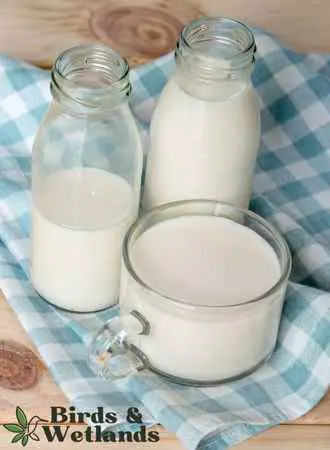
Ducks enjoy small quantities of milk from time to time despite having some degree of lactose intolerance. So when offering ducks milk, be mindful of the amount; otherwise, your feathered friends will have diarrhea and other digestive problems.
Do Ducks Need Calcium?
Yes, ducks need calcium and protein to maintain the health of their bones and feathers. Although ducks can obtain these nutrients from aquatic plants and other healthy treats, they typically require additional sources.
A good alternative is to offer them a small amount of crushed oyster shell or shells from eggs. Mix them with your flock’s food or place them in a separate dish. In addition, many commercial duck feed and duckling feed already contains added calcium, so check the ingredients list on the label before making a purchase.
Can Ducks Eat Cheese?
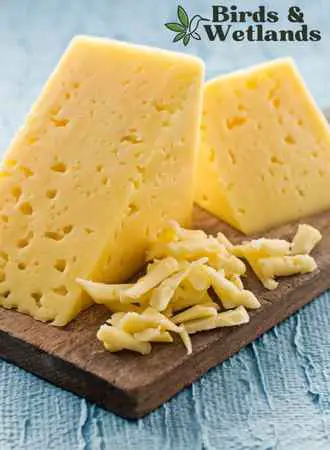
Ducks eat cheese even though they are lactose intolerant to some degree.
However, it is important to remember that cheese contains a high amount of calcium, which can be harmful to the digestive system in large quantities. Additionally, ducks can’t digest large amounts of dairy products.
Therefore, limiting the amount of cheese fed to ducks is fine, giving them only very small amounts of this dairy product as a tasty snack or treat in their diet. You can mix a small amount of cheese into nutrient-rich food such as cooked rice, citrus fruits, and vegetables.
Other Foods to consider for ducks:
Best Duck Feed Pellets
Are you a duck owner looking for the perfect feed to keep your feathered friends happy and healthy? Look no further than Purina Duck Feed Pellets! With their nutritionally balanced formula and high-quality ingredients, these pellets are the ultimate solution for providing your ducks with the nutrition they need to thrive.
Pros
- Complete Nutrition: Purina Duck Feed Pellets are nutritionally balanced to provide all the essential vitamins and minerals that ducks need to stay healthy and strong.
- Easy to Digest: The pellets are specially formulated to be easy to digest, which makes them ideal for ducks of all ages.
- Promotes Growth and Development: With its balanced nutrition formula, Purina Duck Feed Pellets are designed to support healthy growth and development in ducks.
- Suitable for All Breeds: Whether you have domestic ducks or wild ducks, Purina Duck Feed Pellets are suitable for all breeds of ducks.
- Trusted Quality: Purina has been producing high-quality animal feed for over 100 years, so you can trust that your ducks are getting the best possible nutrition with Purina Duck Feed Pellets.
Cons
- Cost: Compared to other types of duck feed on the market, Purina Duck Feed Pellets can be slightly more expensive. However, many customers feel that the high-quality ingredients and balanced nutrition formula are worth the extra investment.
- Pellet Size: Some customers have noted that the pellet size of Purina Duck Feed Pellets can be quite large, which may not be suitable for smaller or younger ducks. However, many customers have reported that the pellets can easily be broken up or soaked in water to make them easier to eat.

Jim Addison is an avid bird watcher and has been obsessed with the activity since he was a young boy.
He has traveled all over North America in search of new and interesting species to observe, and his detailed knowledge of the subject makes him a sought-after expert on the topic.

